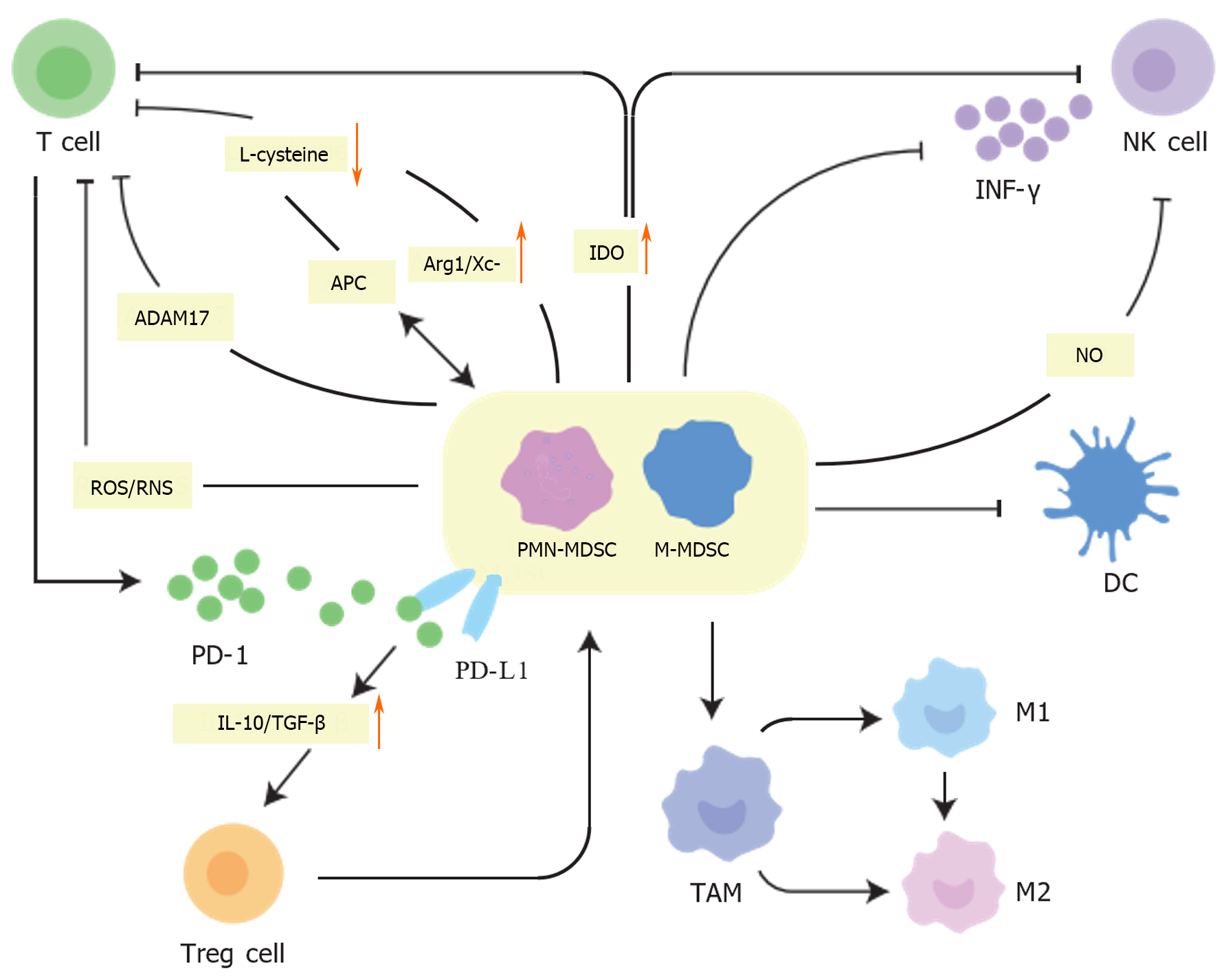Copyright
©The Author(s) 2024.
World J Gastrointest Oncol. May 15, 2024; 16(5): 1690-1704
Published online May 15, 2024. doi: 10.4251/wjgo.v16.i5.1690
Published online May 15, 2024. doi: 10.4251/wjgo.v16.i5.1690
Figure 2 Mechanisms of myeloid-derived suppressor cells-mediated immunosuppression.
The activated myeloid-derived suppressor cells (MDSCs) in the tumor microenvironment express arginase 1 and cystine-glutamate transporters, thus depriving T cells of L-arginine and L-cysteine, which are essential for proliferation and activation. MDSCs compete with antigen-presenting cells for extracellular cysteine and are unable to export cysteine to prevent T cell proliferation and activation. MDSCs also express indoleamine 2,3-dioxygenase 1 to inhibits the activity of T and natural killer (NK) cells under inflammatory conditions. Furthermore, MDSCs express ADAM17 to prevent naïve T cells from migrating to tumors or lymph nodes and subsequently forming effector T cells. MDSCs release reactive oxygen species and reactive nitrogen species to dysregulate the function of T cell. Activated MDSCs express programmed cell death 1 ligand 1, which bind programmed cell death protein 1 on T cells and secrete interleukin-10 and transforming growth factor beta to stimulate Treg activation and expansion. Activated Tregs release immunosuppressive cytokines and suppress other immune cells to inhibit anti-tumor immune responses. MDSC can impair Fc receptor-mediated function of NK cells by producing nitric oxide. MDSCs could impair NK cell function and cytotoxicity by suppressing the production of interferon-γ from NK cells. Since MDSC and dendritic cells (DC) share a common progenitor cell, the reduction in mature DC observed in cancer patients may be due to skewing of the common MDSC/DC progenitor towards preferential differentiation of MDSC at the expense of DC. MDSCs can continue to differentiate into tumor-associated macrophage, which can be divided into the M1 subset that inhibits tumor growth and the M2 subset that promotes tumor growth. In the presence of MDSCs, macrophages are converted to an M2 or alternatively activated phenotype to enhances tumor progression. ROS: Reactive oxygen species; ARG1: Arginase 1; NO: Nitric oxide; IL-10: Interleukin-10; TGF-β: Transforming growth factor beta; VEGF: Vascular endothelial growth factor; Xc-: Cystine-glutamate transporters; DC: Dendritic cells; TAM: Tumor-associated macrophage.
- Citation: Nie SC, Jing YH, Lu L, Ren SS, Ji G, Xu HC. Mechanisms of myeloid-derived suppressor cell-mediated immunosuppression in colorectal cancer and related therapies. World J Gastrointest Oncol 2024; 16(5): 1690-1704
- URL: https://www.wjgnet.com/1948-5204/full/v16/i5/1690.htm
- DOI: https://dx.doi.org/10.4251/wjgo.v16.i5.1690









